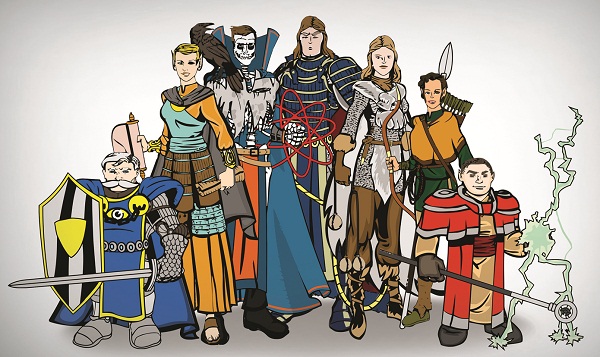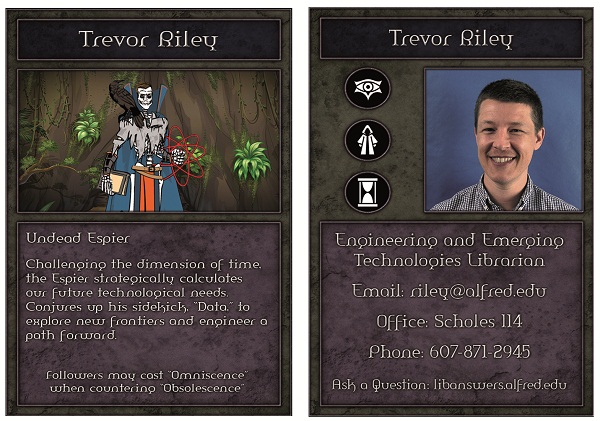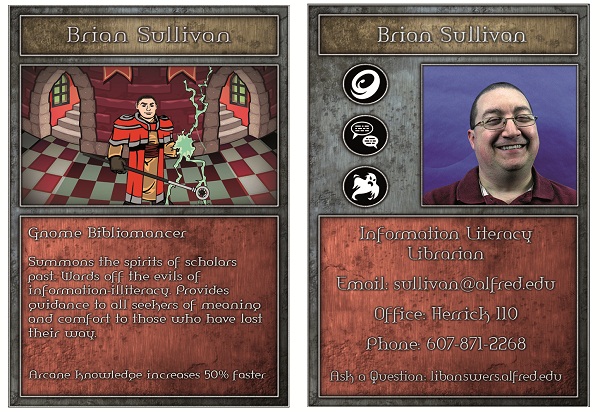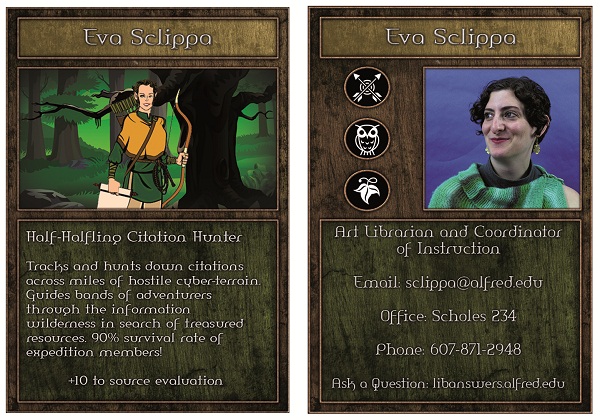2018 School Spending Survey Report
Librarians, the Gathering: Designing and Publicizing a Personal Librarian Program | Peer to Peer Review
Beginning in December 2013, librarians at Alfred University, NY, began discussing the possibility of creating a Personal Librarian Program, inspired by the work of librarians at places like Drexel University and Yale University’s Medical Library. We have always encouraged students to seek out a librarian for research assistance; now we wanted to add a human touch, providing a name and face for students encountering the intimidating task of using a college library for the first time. The librarian trading card programs of other libraries--such as Penn State and the University of Rochester--gave us the idea of creating unique cards and personas for each librarian. We decided to take the trading card idea, give it a fantasy roleplaying spin, and use these new “Magic: the Gathering”-esque cards to help connect students to their librarians and publicize the program. With this, “Librarians, the Gathering” was born.

Character creation
One of the core elements of the program were the personas: fantasy identities the librarians took on, which were transformed into collectible cards for the students. Each participating librarian worked with the team to write a description of their persona, translating their real-world abilities and skills into “powers,” “spells,” and other language appropriate to a fantasy world. An information literacy librarian, for instance, became a “Gnome Bibliomancer,” whose abilities included “warding off the evils of information-illiteracy.” Hero Machine, a free superhero creation tool, was used to make the initial images of each librarian, providing them with costumes and attributes appropriate to their new fantastical identity. These images were then placed in customizable Photoshop card templates from the website GraphicRiver. The librarian’s actual photo, title, and contact information were provided on the back of the card, giving students an easy way to recognize and contact their personal librarian.
Spreading the word
In fall 2014, our 503 first- year undergraduate students were assigned their very own Personal Librarians to be their go-to person for all their research needs. Where possible, librarians were assigned by students’ school/college and major. First-year students received a packet at orientation, or through campus mail for those we did not meet at orientation, which included:- A letter introducing their librarian and explaining ways in which their librarian can assist them
- An invitation to a dessert reception where they could meet their librarian
- A trading card with their librarian’s contact information, unique fantasy persona, and specialized skills
- A brochure with basic library information

Measuring impact
Anecdotal evidence suggested that the program was successfully encouraging students to contact their librarian for research help, but we wanted to gather more concrete data. At the start of the spring 2015 semester, we sent out a survey to all 268 faculty and all 503 first-year students. Our response rate was approximately 21%. Here are some of the things we learned:- Only 53% of faculty knew about the Personal Librarian Program prior to the survey
- 24% of faculty referred students to their Personal Librarian
- 36% of students could not identify their Personal Librarian
- 22% of students had contacted their Personal Librarian. Of these, 91% said contacting their Personal Librarian was helpful
- 78% of students agreed that having a Personal Librarian makes it more likely that they will contact a librarian for help.

Getting even more personal
For fall 2015 we expanded the program to include incoming transfer and graduate students, in addition to first-year undergraduates.We have also more fully included faculty and academic units, in the hope that students will be caught at the point of need and recommended to us. One exciting future partnership we see on campus is with the writing center. Our hope is that the writing center tutors can identify when a student is struggling owing to research-related issues. At that point, the tutor can then use the database to look up the student, find their personal librarian, and connect the two.Personal librarians for everyone!
Our Personal Librarian Program was geared for an academic setting, but there are several lessons that could easily be applied to school, public, and other types of libraries as well.- Trading cards are an easy and playful way to introduce library staff to patrons
- Personalizing library services by attaching a name and a face to them helps to make the library more approachable for reluctant users
- Colorful and creative programming is a way to drum up enthusiastic advocates in your community
- Regular, consistent contact is an important element of any outreach program
- Finally, by showing that we dono't take ourselves too seriously, librarians can lower patron anxiety, and remove barriers to our resources and services.
Brian Sullivan is the Information Literacy Librarian at Herrick Memorial Library, Alfred University, NY. Eva Sclippa is the Art Librarian and Coordinator of Instruction at Alfred University’s Scholes Library. Trevor Riley is the Engineering and Emerging Technologies Librarian at Alfred University’s Scholes Library.
RELATED
RECOMMENDED
TECHNOLOGY
ALREADY A SUBSCRIBER? LOG IN
We are currently offering this content for free. Sign up now to activate your personal profile, where you can save articles for future viewing









Add Comment :-
Comment Policy:
Comment should not be empty !!!